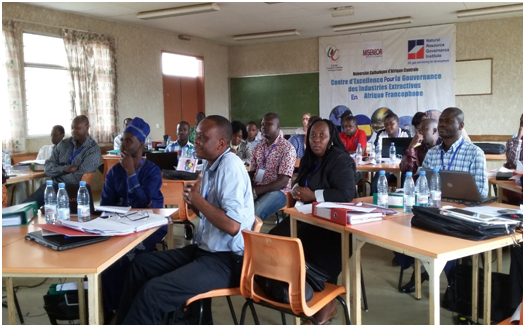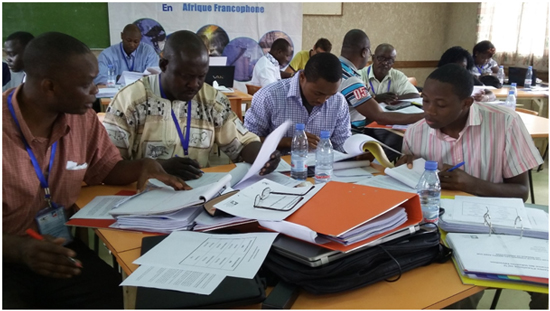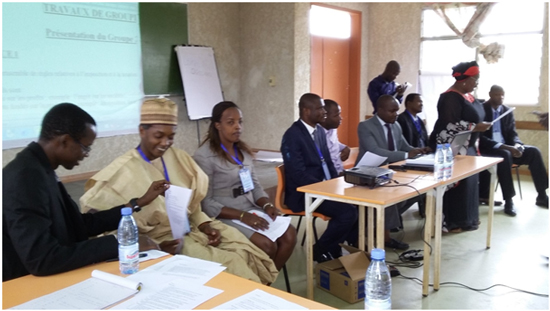
For First Time, Legal Community Takes Part in Francophone Africa Extractives Course
Citizens from resource-rich African countries are showing ever-greater interest in the management of extractive resources. Civil society members and journalists are demanding transparency and accountability. Importantly, those in the legal space are also taking part to defend local community rights, inform advocacy and use disclosed information to track mismanagement.
NRGI’s fifth annual summer school on oil, gas and mining governance in late August welcomed magistrates and barristers for the first time. In all, we hosted 32 delegates from 11 Francophone African countries.
The two-week residential course is thrown by the Francophone Africa Extractive Industries Knowledge Hub (Centre d’Excellence sur la Gouvernance des Industries Extractives, or CEGIAF), put in place by NRGI and the Catholic University of Central Africa.

Legislation, contracts, fiscal regimes, revenue collection and management, development investment, and socio-environmental impact were key discussion points.
“In 10 years working in the field, I never received such education on natural resource issues,” said Mohamadou Dialo from Développement Sans Frontières in N’Gaoundéré, Cameroon.
Boubacar Ouali of SwissAid, Niger, said the course built on his human rights work and would help him provide different assistance to in-country partners like the Network of Organizations for Transparency and Budget Analysis (ROTAB) and the Monitoring and Action Group on Extractives (known also by its French acronym GREN).
“My human rights background was not sufficient to provide strong technical support to these partners when it came to extractives industries issues,” Ouali said.
Alumni from previous courses have been ambassadors of this program and their performance has been a real testimony to its impact, said Eric Etoga, a representative of the Center for the Environment and Development in Cameroon and a recent participant. “I knew that I would learn a lot. I have to confess that fiscal issue has always be a nightmare for me. I came to the course with the ambition to overcome this challenge and exercises we did were very helpful,” he said.

Increasing female participation in the course has been a key target for NRGI. “I am so grateful to CEGIEAF to the opportunity to attend the course and to NRGI and Misereor for their scholarship,” said Denise Kandondo, from OLUCOME, Burundi.
Guinea, Cote d’Ivoire, Niger, Burkina Faso, Cameroon, Mali, Republic of Congo and DRC are among Francophone Africa countries reviewing their legal framework around extractive industries. Post-course alumni have made strong contributions to the legal reform process and have developed guidance for reform of country-specific mining codes.
Participants from DRC expressed frustration: after an open and participatory review process of their country’s mining code, and a draft bill was sent to parliament, it was, once again, withdrawn. Participants said these practices are undermining good sector governance.

Progress on contract issues in the DRC, Guinea, and the Republic of Congo were also discussed. Legal reform has facilitated better response to civil society demand, making disclosure of contracts mandatory in countries. These countries include Niger, Mali, Cote d’Ivoire, and more recently, Burkina Faso. The challenge now is to publish all contracts and make them accessible. According to some participants, although their country decided to disclose contracts, the government did not publish all in full.
Countries such as Cameroon, Gabon, Chad and Central African Republic were called on to make further disclosures. Participants discussed contract negotiation experiences and civil society involvement in monitoring contracts and legal obligations in Burkina Faso, Cameroon (click here for the French-language version), DRC, Guinea and Niger.
Evelyne Tsagué is NRGI’s Africa deputy director.
Authors

Evelyne Tsagué
Africa Capacity Development Advisor